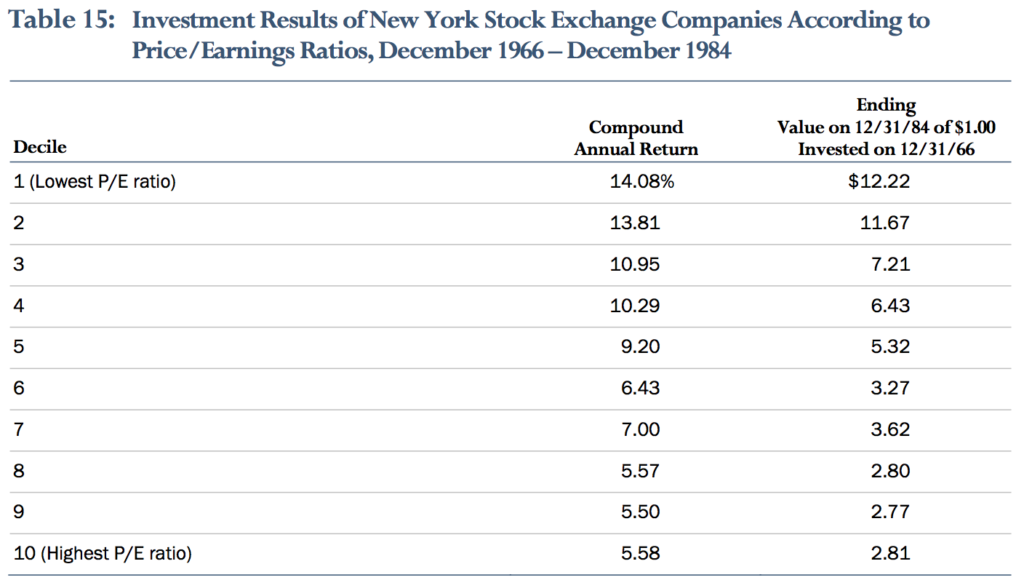
If a company has a pattern of reporting the same extraordinary item year after year, it might not be too extraordinary. The annual composite dispersion presented is an asset-weighted standard deviation calculated for the accounts in the composite for the entire year. Overpaying for a stock is one of the main risks for value investors. The income statement tells you how much revenue is being generated, the company’s expenses, and profits. Furthermore, many investors like the margin of safety provided by a stock that’s purchased for less than what it’s inherently worth. Roumell was selected to participate in, and won, two consecutive Wall Street Journal stock picking contests in and
{{content.sub_title}}
Recently, our Cayuga Fund class had a discussion surrounding deep value investing. While this phrase is commonly used, it is rarely defined. Many stocks right now could be thought of as deep value but where is the line drawn? One Cayuga Fund Portfolio Manager defined deep value as investing in small companies that are not widely followed, after conducting significant primary research. However, the overall class discussion led us to agree on a more quantitative definition; stocks that wat in the bottom quartile of their industry based on vapue multiples. PIMCO defines deep value investing as investing in stocks that are significantly undervalued based on their intrinsic worth determined by asset-based or cash flow valuation.
What is value investing?

Value investing is an investment strategy that involves picking stocks that appear to be trading for less than their intrinsic or book value. Value investors actively ferret out stocks they think the stock market is underestimating. They believe the market overreacts to good and bad news, resulting in stock price movements that do not correspond to a company’s long-term fundamentals. The overreaction offers an opportunity to profit by buying stocks at discounted prices—on sale. Warren Buffett is probably the best-known value investor today, but there are many others, including Benjamin Graham Buffet’s professor and mentor , David Dodd, Charlie Munger , Christopher Browne another Graham student , and billionaire hedge-fund manager , Seth Klarman. The basic concept behind every-day value investing is straightforward: If you know the true value of something, you can save a lot of money when you buy it on sale. Just like savvy shoppers would argue that it makes no sense to pay full price for a TV since TVs go on sale several times a year, savvy value investors believe stocks work the same way.
Learn how investing in value stocks can make you richer.
Recently, our Cayuga Fund class had a discussion surrounding deep value investing. While this phrase is commonly used, it is rarely defined. Many stocks right now could be what is deep value investing vs value investing of as deep value what is deep value investing vs value investing where is the line drawn? One Cayuga Fund Portfolio Manager defined deep value as investing in small companies that are not widely followed, after conducting significant primary research.
However, the overall class discussion led us to agree on a more quantitative definition; stocks that trade in the bottom quartile of their industry based on relevant multiples. PIMCO defines deep value investing as investing in stocks that are significantly undervalued based on their intrinsic worth determined by asset-based or cash flow valuation.
Now you may be wondering why this discussion is useful for the MBA FaceOff; deep value investing could be a useful strategy to select stocks that have been unfairly punished by the market and are well-positioned for a rebound.
However, in order for this strategy to be successfully implemented, a near-term catalyst also has to be present. Given the limited time remaining in the competition, this is likely to be a high-risk, high-reward strategy. Sign up for free newsletters and get more CNBC delivered to your inbox. Get this delivered to your inbox, and more info about our products and services. All Rights Reserved. Data also provided by. Markets Pre-Markets U. Deep Value Investing. Kira Dietrich. News Tips Got a confidential news tip?
We want to hear from you. Get In Touch. CNBC Newsletters. Market Data Terms of Use and Disclaimers.
More importantly, once you have purchased the stock, you may be tempted to sell it if the price falls. Psychological biases can push a stock price up or down based on news, such va disappointing or unexpected earnings announcements, product recalls, or litigation. What is it that we might be doing right wherein unlevered ugly ducklings are beating the debt-enhanced beautiful swans? The verification and performance examination reports are available upon request. Browne also suggests studying a company’s competitors to evaluate its future growth prospects. Our top ten equity holdings, on the other hand, collectively not only have no debt, but also hold significant amounts of cash. Value investors require some room for error in their estimation of value, inesting they often set their own » margin of safety ,» based on their particular risk tolerance. Thus, while math is at the center of what we do, deep value is not the domain of accountants, economic forecasters, and those never wanting to leave their offices. Investing Essentials. One thing investors can do is choose the stocks of companies that sell high-demand products and services. Moreover, the reinvestment opportunities should have a long runway. The basic concept behind every-day value investing is straightforward: If you know the true value of something, you can save a lot of money when you buy it on sale. As economist John Maynard Keynes said, «The market can remain irrational longer than you can remain solvent. Your Money. On ix of that, the company might grow and become more valuable, giving you a chance to make even more money. You can risk losing part or all of your money if you overpay. Results are based on fully discretionary accounts under management, including those accounts no longer with the firm.

Comments
Post a Comment